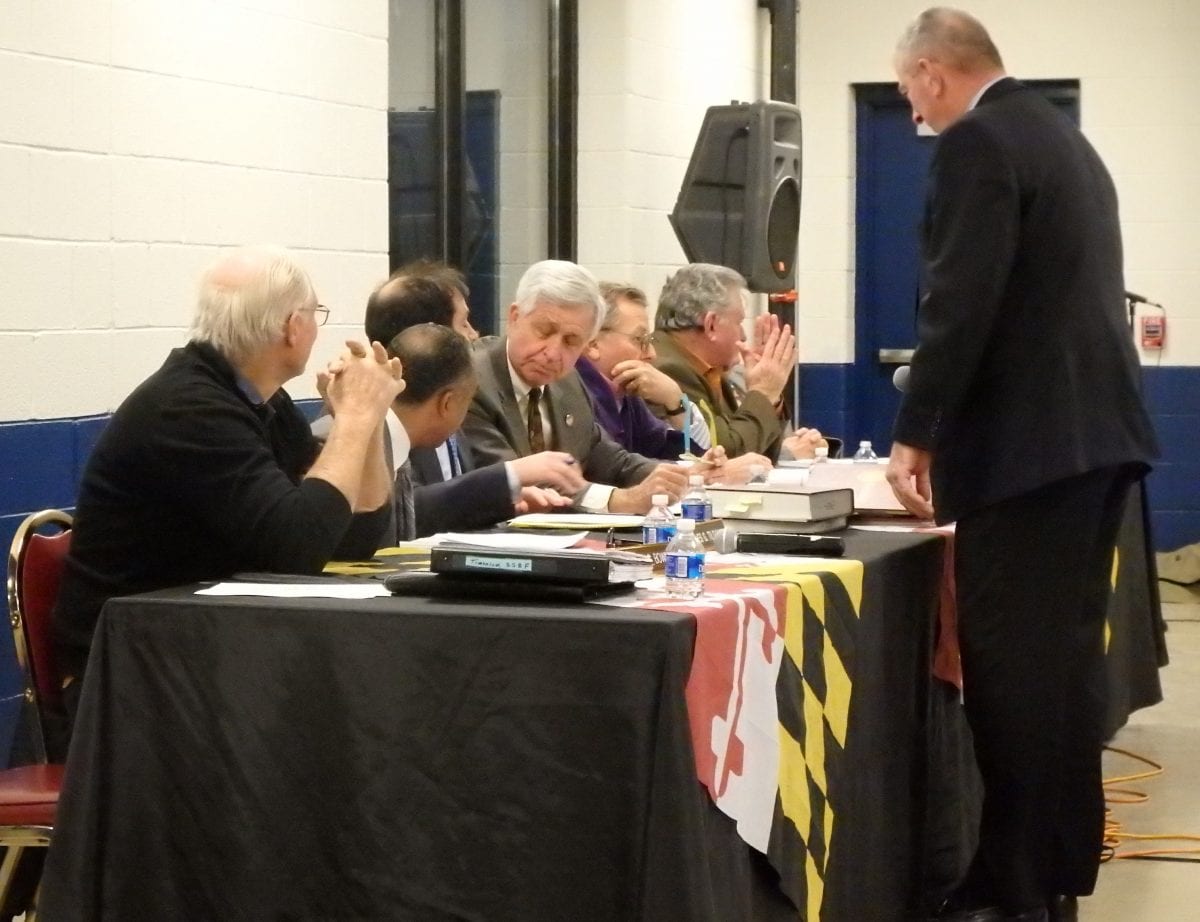McDaniel: “Not riding off into the sunset”

Maryland Racing Commission. John McDaniel is at center, with his face turned towards the camera.
by Frank Vespe
The last time that John McDaniel wasn’t a member of the Maryland Racing Commission, Ronald Reagan was president of the United States.
For 32 years — including three different stints as chairman — McDaniel has been one of the nine men and women tasked with overseeing the conduct of Thoroughbred racing in Maryland.
That tenure has come — unexpectedly to most in the state’s racing community — to an end. McDaniel’s last meeting as chairman, and also as a member of the Commission, came in November. Michael Algeo, a retired judge, will join the Commission and take over McDaniel’s spot as chairman.
“My grandfather always told me in any project, you have to know two things,” McDaniel said Thursday. “You have to know when to go into it, and you have to know when to leave it.”
During his long term, McDaniel’s lived through racing’s boom-and-bust cycle. His early time on the Commission coincided with the halcyon years of Frank De Francis’ leadership of the Maryland Jockey Club.
Those years gave way, first to increasing acrimony between horsemen and the track and later to the gradual decline of Maryland racing to, by the years around 2010, a mere shell of its former self.
These days, following the introduction of slot machines subsidizing the sport and the completion of a 10-year agreement between the tracks and the horsemen, brokered by McDaniel and his predecessor as chairman, Bruce Quade, Maryland has been home to a steady drumbeat of good news.
“I’ve see the ups and downs,” McDaniel noted. “It’s in as good a shape now as I’ve seen it in years.”
McDaniel, on his way to a fundraiser for Governor Larry Hogan when we spoke, said he was “disappointed” to leave the Commission because racing “is a passion of mine,” but added that he was not upset.
“I loved it,” he said of his time on the Commission. “And I’m proud of what the Commission’s accomplished in recent years.”
McDaniel pointed to the 10-year racing agreement as one of the major recent Commission accomplishments, as well as the progress the state has made on medication rules.
“Getting the racetrack, the Stronach Group, Frank Stronach himself, and the racing folks here in the state all back on the same pathway,” he said. “That was the biggest accomplishment of the Commission.”
Looking ahead, McDaniel went to the same place that many have to name a potential trouble spot.
“The part that’s going to be challenging in the future is going through the Pimlico study, however that turns out to be,” he predicted.
The Maryland Stadium Authority is in the midst of a study of the state and future of Old Hilltop, specifically whether and how the track can be transformed into the modern facility necessary to host an event like the Preakness. The first phase of that study is expected to be complete next year.
Though Pimlico plays host to a dwindling number of live racing days, it remains an outsized presence in the minds of many in the racing community. And the economic impact of the Preakness Stakes on Maryland, Baltimore, and the neighborhoods adjacent to the track is sizable. The decisions over its future may be tricky.
But that will be in 2017 when, for the first time since the days when The Breakfast Club was hot and Wham! had two of Billboard’s top three songs in the year-end Hot 100, those decisions won’t be John McDaniel’s to make.
“The stars lined up, and it’s a good time to leave,” he said. “But I’m not riding off into the sunset. I love the game, I love the people, and I’ll be around.”







